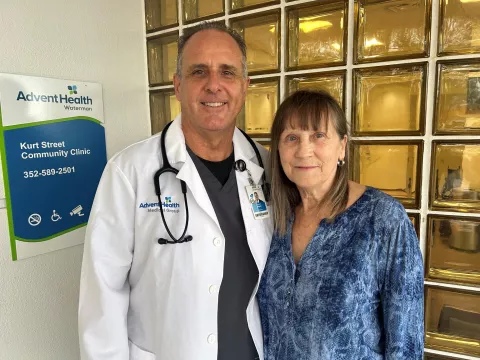- AdventHealth

What better time than August, when children everywhere are heading back to school, to direct attention to the importance of staying up to date on recommended vaccines? That’s the idea behind National Immunization Awareness Month, which, according to Britannica, was first observed in August 2013 and was intended to educate families on how vaccines can protect their children.

Vincent Hsu, MD, infectious disease specialist and infection control officer for AdventHealth, stresses that while the yearly observance now coordinated by the Centers for Disease Control and Prevention (CDC) can serve to bring timely awareness, “It’s important that we recognize some immunizations don’t only happen once a year or just in the fall. Immunizations need to be considered year-round,” for children and adults. And understanding that, Dr. Hsu says, is key to safeguarding public health by preventing outbreaks of vaccine-preventable diseases, particularly when it comes to protecting vulnerable populations.
Vaccine hesitancy, exacerbated by the pandemic and driven in large part by skepticism and misinformation about vaccines – and not just for COVID-19 – remains a concern. Some of that hesitancy, Dr. Hsu asserts, stems from never having seen how severe the diseases can be and believing, erroneously, that getting the disease is preferable to vaccination and always affords better immunity.
“The whole purpose of immunization is not only to protect you against certain preventable diseases but to keep you from transmitting disease to others,” Dr. Hsu says. “We have the data: Vaccines have saved lives. We know that when there is an increase in hesitancy or even refusal of vaccines, there is an increase in outbreaks of those diseases.”
"We have the data: Vaccines have saved lives."
Addressing the vaccine-hesitant means listening to those individuals’ concerns and then taking the time to explain why it’s important to get vaccines, using data-driven responses.
In light of COVID-19’s continuing significant summer surge – which keeps it from easy categorization as a seasonal virus – Dr. Hsu highly recommends in accordance with CDC guidelines that all those who are eligible get the updated vaccine recently approved by the Food and Drug Administration, as well as the flu vaccine this fall.
For the third virus that completed the not-so-long-ago “tripledemic,” Respiratory Syncytial Virus (RSV), the CDC is now recommending ages 75 and older receive the vaccine, as well as those ages 60 to 74 who are at increased risk of severe RSV, such as those with chronic medical conditions like lung or heart disease or those living in nursing homes.
Much goes into the decision-making process for annually updating vaccine schedules, including a thorough review of disease burden, vaccine effectiveness, and cost-effectiveness studies. The CDC's Advisory Committee on Immunization Practices (ACIP) evaluates real-world data and scientific evidence to make informed recommendations. This process includes analyzing the latest research, consulting with experts, and considering the public health impact of the vaccines.
Whether at school, at work or just out and about, Dr. Hsu says taking the same preventive measures heard over and over again during the pandemic are just as important now as they were then: Wash your hands, avoid contact with others who are sick, stay home if you are sick, and for good measure, he adds, “I think there’s something to be said for wearing masks a little more generously.”
Recent News
Three Kings Day reminds us of the beauty of tradition, faith and the joy of giving, honoring the journey of the Wise Men. Watch a special video message from Sheila Rankin, CEO of AdventHealth...
Dr. Joseph Lopez, chief of pediatric head and neck surgery at AdventHealth for Children, was honored with the prestigious Professional of the Year Award at the 27th Annual Don Quijote Awards.
Giving back to his hometown, Dr. Ryan Day brings advanced robotic surgery to local patients, offering life-saving care close to home.
The holiday season can increase heart attack risks due to overindulgence, stress, and ignored symptoms, but Dr. Hector Lozano advises moderation, staying active, managing stress, and sticking to...
Transplant is AdventHealth Transplant Institute’s 5000th kidney transplant
David Weis has been promoted to serve as president/CEO for the region covering east Volusia, Flagler and St. Johns counties. Lorenzo Brown has been promoted to serve as president/CEO for the region...
Deputies from local fire and police departments dressed as elves as part of an eight-year long tradition bringing festive cheer to kids and families staying at the hospital this holiday season.
For Franco and Felix Valverde, growing up as identical twins meant more than just sharing a birthday—it meant sharing an unshakable bond.
For Franco and Felix Valverde, growing up as identical twins meant more than just sharing a birthday—it meant sharing an unshakable bond. Their connection is evident in the way they look at each other...
At 62 years old, Rudolph had never dealt with chronic medical conditions or taken routine medications. But when her symptoms persisted, she found herself making a few trips to the emergency department...
Nestled in Eustis, Fla., AdventHealth’s clinic provides free health care services to uninsured adults who qualify in North Lake County. With the support of clinical volunteers, the clinic treats...
On Dec. 13, MarComm team members who are fans of Taylor Swift, aka Swifties, handcrafted over 100 friendship bracelets for moms at AdventHealth for Women whose babies made their debut on Taylor's...












